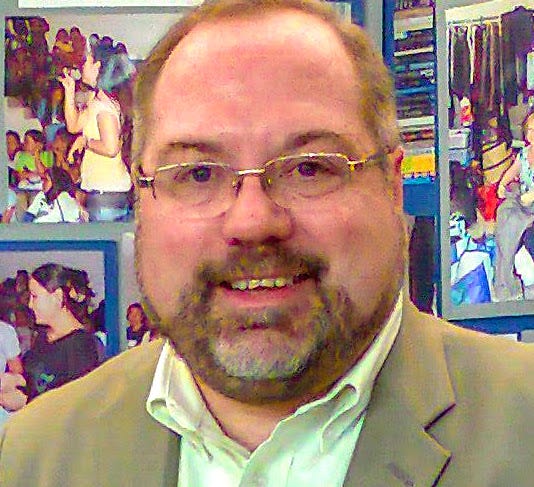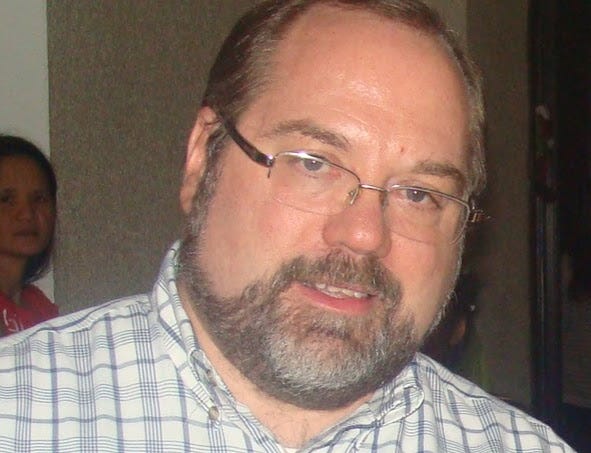Jim Buie: Okay, Phil, so tell me about Libya. I guess you were in Benghazi, Benghazi, Benghazi.
Phil Lohre: Yes. I went to Libya in 2019, just before COVID started. I was offered a position at the Benghazi European School, which was also known as the Greek Community School of Benghazi. It was founded in the 1970s for the Greek community there, which was actually quite large. So the owner of the school and the head of the board were both Greeks, ethnic Greeks who are still there. Although most of the Greek community has fled, they fled after Gaddafi was overthrown. Gaddafi actually protected the Greek community and protected them as a minority and they thrived.
But once Qaddafi was overthrown and the radical Islamists under Daesh, ISIS, Al-Qaeda came in and took over, they were targeted as Christians.
As you know, Benghazi, along with the rest of Libya, was an Italian colony. So the Italians had a cathedral there, a church. They had several other small churches. And what ISIS al-Qaeda did is they targeted those structures. They targeted the people who went to those churches and mass and such. There was a Greek Orthodox church and cathedral as well.
1:28 So the Western foreign communities that were non-Muslim either fled or were killed. So it was actually under Gaddafi a fairly tolerant and accepting society. But once Gaddafi was overthrown, the radical Islamists were very brutal and vicious. So that was tough.
Buie: But you did not arrive until after Gaddafi was gone. You arrived in 2019…And you were there until 2020, just a year.
Lohre: Yes. So what had happened like two years before, from 2017 to 2019, basically, local militia groups, insurgent groups of Libyans rose up against the ISIS, Al-Qaeda, Daesh guys, the guys that were responsible for killing the ambassador, the Benghazi, and pretty much wiped them out. They eliminated them. And your average Libyan, the Libyans under Gaddafi and such were very well-educated and tolerant. And many of them had lived and worked in the West, in UK or Ireland or Italy, strong ties to Italy and Greece. And they were really actually a tolerant bunch. They weren't fanatics. They weren't really overly religious. And they intermarried, intermingled with Westerners and such. And they didn't push their religion on others. And they didn't force others to be like them.
In many ways, the West gave Gaddafi a bad rap. He was a secular socialist pretty much. He himself was religious, but he didn't really force it on others and push it so much.
3:25 So after he was overthrown, things went downhill because the country split and various factions divide for power. And you ended up having a faction in the east and a faction in the west.
So you had in the eastern part of the country an American-sponsored guy, Khalifa Haftar, who had become a US citizen. He was a Libyan general who was captured in the 80s in Chad. He was rescued by US Special Forces and brought back to the US basically as a CIA asset. He was given US citizenship. He lived in Langley, Virginia, and worked actually for the CIA. He then returned about 2017 with a U.S. blessing to help go after the Islamists. And once he kind of led a faction called the Libyan National Army and then they crushed them.
Then he kind of figured, hey, I'm here. I'm going to be boss. He named himself Field Marshal and called himself self-sold president. He basically cut his ties with the U.S. But his faction in that part of the country ended up getting support from Egypt, the UAE, and Saudi Arabia, as well as France.
And to some degree, the U.S. — Erik Prince and the Blackwater guys — also helped out.
The other faction in Tripoli, the government of National Accord, ended up getting support from Russia, Syria, and Turkey.
There ended up being a civil war there, and the UN basically froze their assets, froze their money, and put an embargo on any oil exports and petroleum exports, which is their big source of money.
5:13 So the Libyans felt they never were able to really gain the benefit of Qaddafi not being there when Qaddafi was in charge.
5:22 He spent a lot of the money on military equipment, didn't have a large army, didn't have a large number of soldiers, but he kept buying weapons, a lot of weapons.
5:31 So he sent a lot of money and spent a lot of money on sub-Saharan Africa. Just before he got overthrown, he started to do this because they'd resolved the TWA deal, the 003 Lockerbie thing, and they'd made overtures to the West.
They were just starting to open, and Qaddafi and his son Saif and others wanted to make Libya like a tourist haven, make it open to the West. He was just starting to do that, and they were just selling more oil in the market. The embargo was lifted, and then boom, the uprising.
6:07 So the Libyans kind of feel they got robbed of that. Some, many of them fondly remember Gaddafi. But others, if you went against him or crossed him politically, you disappeared. I was talking to this So, you know, many of them fondly remember Gaddafi. But others, if you went against him or crossed him politically, you disappeared.
I was talking to this one fellow, a Libyan guy married to a British woman…He never forced her to convert or made her convert to Islam. She's still Christian.
6:35 But he was saying, okay, you know what happened? They show up in two or three police cars, throw a guy in the back of the trunk, and then you never see him again. So that type of thing.
6:47 So nowadays, they're not really afraid of the police so much anymore, but it's a mess economically because they still have this embargo. And you can't send money out. There's no Western Union. The banks don't. When I was there, I was paid through Sweden because the owner of our school had connections with the owner of the primary school who was Swedish…My pay originated in Sweden and was sent monthly to the Philippines…You could send nothing from Libya. You couldn’t really exchange….
I did have some black market dealings, so to speak. One of the guys at the school wanted me to tutor (a bank executive) in English who wanted to immigrate to the U.S. He helped me with some money conversion just before Christmas, so I had some extra money….A portion of our salary was paid in Libyan dinar. About 30%. And 70% was in Euros….We had some expenses there. We had free housing, free Internet. We had to buy our own food.
Buie: Was it a good deal or how would you sum up your year in Libya?
Lohre: It was ok. I didn’t mind.
Buie: What about safety? Did you feel safe?
I never felt unsafe. We had connections with some of the kids at school. One of them, his father was a police general. Another was a colonel. Another was in charge of the militia and it was made known, okay, don't touch the employees of the school. You touch these guys, we're going after you, touch these guys, you're dead, just leave them alone. Don't touch them. Regardless, we had a driver who took us to school and back every day.
11:08 Supposedly, they were going to give us a license and a car, but they decided not to do that. So we took a different route home every day, a different route to school, just in case.
Buie: And then what about your accommodations where you lived?
Lohre: It was quite nice. A villa. It was really nice. We had a big, huge outside terrace. We had a really nice apartment, with a generator, and the power would go out.
Right across the highway from us was kind of a no-go zone. It was like the black market area, which had some rival gangs. I wouldn't say militia, but criminals. They'd be fighting each other for control. That's where they did a lot of the money laundering, the money exchanging. You could get black market goods. There was prostitution, mainly African women. And they would have other unseemly things going on there. And the police and the military generally didn't go.
12:11 But if they did, they'd go in with all their weapons firing and gun tracks. Get a guy and take him out or kill him and just leave. So that was just across the street from us. We would hear every night. Weapons fire and stuff like that.
Buie: You didn’t go on walks in the evening?
Lohre: No…That was kind of the problem with it.
Buie: My impression of Libya is that the so-called Benghazi scandal wasn't really a scandal. It was just a terrible thing that happened. What I do wonder about was the decision of Obama and Clinton and the rest of NATO to topple Qaddafi, and whether that was a good decision or not, it appears that Libya has not recovered even now?
Lohre: No. In retrospect, it wasn’t. Or it's also like in Syria, I think, actually in Syria had Obama taken decisive action early on after it was determined that chemical weapons were used. I think Assad could have been toppled and that situation could have been stabilized. But I think all in all, the Western powers moving into Libya as they did was not necessarily a beneficial thing. Because in the long run, the Libyan people are suffering because they're still not a unified state. The major powers are actually now, they're trying to use each faction to their own benefit and trying to get into the mineral wealth.
13:54 So, you know, Qaddafi was no saint and he did some horrible things, but he kept the nation together and the nation was fairly prosperous. And many of the people were fine for those days.
14:06 I was with a group of expats that remained and some of them came back. And they would all say that they knew Ambassador Stevens and they hung out with him. And he was fluent in Arabic and culture. And they thought he was a great guy. Actually, the local Libyans felt it was a horrible loss….It wasn't the Libyans who killed him. It was some radical militias that were supported, trained and egged on by other Islamist groups. They were very unhappy to see him dead.
14:44 They had one of our friends…who showed us where the place was. It's all bulldozed. This is where the ambassador was. And actually around it, it's kind of in a suburban area. So there were like fields around it that were owned by this rich guy that he pastored his goats and sheep. So actually it was kind of easy to get to.
15:11 But the local people and even the expats who remained all fondly remember Ambassador Stevens. And even the Swedish guy who ran the primary school…his company ended up with the ambassador's car and they didn't want it. So we got the ambassador's armored limo. It's in our garage. ISIS and Al Qaeda come along, you know, so they wanted to unload that thing real quick.
Buie: You mean in your garage or in the school's garage?
15:46 Lohre: Well, okay, there was a couple of companies. There was an engineering company owned by the Greek guy, and there was the Swedish guy owned like a drilling company that drilled for water and occasionally oil and stuff, mainly water. So that drilling company...They had several vehicles. And they're the ones that inherited the car and it ended up in their motor pool garage, which Andrews didn't like.
Buie: Oh, God, how nervous making that would be.
Lohre: Yes.
So Libya itself, I mean, we the people were friendly and OK. They hadn't had seen that many Westerners, but many of the ones that we worked with were Western and such. And we hung out with an expat group. So we hung out with a group that included like the Italians had reappointed an ambassador there to Tripoli, but he did visit the consulate, what was left of it, in Benghazi, basically stayed in a hotel. He was always followed around by a security guard who was an ex-San Marco Marine who always had a pouch which had a satellite phone and a Beretta pistol. And he never drank. The only other guys who always drank were ambassadors. But this guy, although never, he was totally cool. He knew English pretty well because he worked with the U.S.
But he was totally focused on keeping the ambassador safe. So we met him.
17:30
There were some pilots we met, some Greek pilots mainly who worked for the local airlines there. One guy was a former Greek Air Force pilot. He was training some political pilots. And these were cool people to hang out with.
17:43
And then we had this one guy who was a retired medical doctor, got his degree in the UK. His daughter went to school at our school, but then went to the UK in Cambridge. And she works for the UN. She came back.
17:58 So there was a really cosmopolitan group of Western expats, very similar to the people we would have met in the UK. This was the group that I hung out with. We'd have a party every weekend. They would have drinks freely, alcohol.
Buie: What about getting alcohol. Where would you get it?
Lohre: Either the pilots would bring it in or the diplomat daughter or stuff. The real stuff…We made our own, basically. Everybody was making wine or the clear booze. Anders made a lot of it. He'd bring it over like, hey, Phil, I have that bottle. It's a big liter bottle. He'd mix it with orange juice or pineapple juice or and some of the wine we made was pretty good you know i didn't get beer much but uh wine and that and the stuff that was brought in by the pellets yeah we never had a lack of it because some of these guys they make a whole like you know huge jug of it…
Buie: In Saudi Arabia i think they'd make bathtubs full…
Lohre: Yeah, they did when I was there. And in Kuwait, too.
Buie: I guess you were in Libya when the virus hit. How did that change things for you?
Lohre: That wasn't good. And basically we came back from the Philippines, went to the Philippines for Christmas and we got back around January 3rd. A couple of weeks after that, you know, COVID started. We didn't really know about it then, but they closed down the airport, Benin Airport in Tripoli, in Benghazi, it's Matic Airport. And because of international travel restrictions that were starting. And it never opened until we left.
All the kids were concerned about it. We had several of the kids whose parents were doctors or nurses at local hospitals, and they were a bit concerned. Then we had a school meeting about it. And they said, okay, we're very concerned. We're going to do protocols, hand sanitizing, masking. We're going to separate the desks.
And then all of a sudden we had one of the holidays, Eid. They gave us like 10 days for that, almost two weeks. And then I got sick. I came down with covid…it actually was relatively mild. I was just in bed and had a really hard time breathing….But I recovered. Maria got it mild. So then they started classes back. They didn't let any students back.
They did bring (the faculty and staff) back to the school. We had to wear masks, and get our books and materials. Then they set up online classes…by Zoom…We even did exams, GCSEs and A-levels online. ..
(We wanted to leave) but getting out, we were stuck because the airport was closed. And then I found out I (as an American) had to get a visa to go to the Philippines…So I had to apply for the visa at the Filipino embassy in Tripoli, which was still open…All of a sudden, just as I was about to (leave)…they closed the embassy and didn’t issue the visa.
Buie: Oh my God!
Lohre: They sent me an email….The Arab League brokered some kind of ceasefire between the two warring actions in Libya, (creating) a corridor between Benghazi and Tripoli. So you could drive there, but you couldn’t drive along the coast road, which is the quickest, most direct route, because the two opposing armies were still facing off and fighting each other…So we had to drive down south…across the Great Libyan Sand Desert, and then back up north into Tripoli. It took about 20 hours, and we had to bring our own gasoline….from cans…And when you do that, the gas spills all out, gets all over you. So that was lots of fun.
We got stopped at multiple checkpoints by both sides…Maria set in the back (wearing) a hijab, and didn’t say anything.
The driver said, “don’t talk. I’ll do it. Don’t say a word. Don’t look at them. Just look down. Don’t say a word. I’ll talk. I say everything.
So we go through…Matiga Airport in Tripoli had actually been attacked and shelled by Haftar’s forces. You could see hulks of burnt-out aircraft on the tarmac. Hangers had been blasted with rocket shells and mortar shells. And the main terminal had been hit.
(But) we eventually got out…and to…Istanbul, Turkey….Then to Warsaw and New York.
Buie: Wow. What an adventure. 14:55
Lohre: Yeah, that was fun.
Buie: (Laughter) Spoken like a true expat!…Other people might say it was a nightmare.
Lohre: (There was some trouble getting visas, so they put us up in Greece for about 15 days (and paid for hotel and for tours for us)…We had a really great time in Greece….
As for the Libyans, they’re being manipulated now as part of a great power struggle between the major factions, USA and Russia…and their proxies. Saudi Arabia, UAE, Turkey….
International Educator's Legacy
My friend and former colleague Phil Lohre (1964-2025) of Amsterdam, NY was a brilliant historian, educator, and global adventurer. I was shocked to learn that he died suddenly this month at age 60 while recovering from open heart surgery in Albany, NY.








